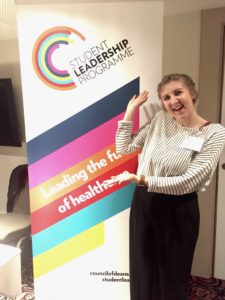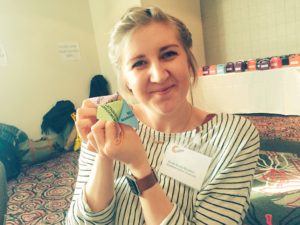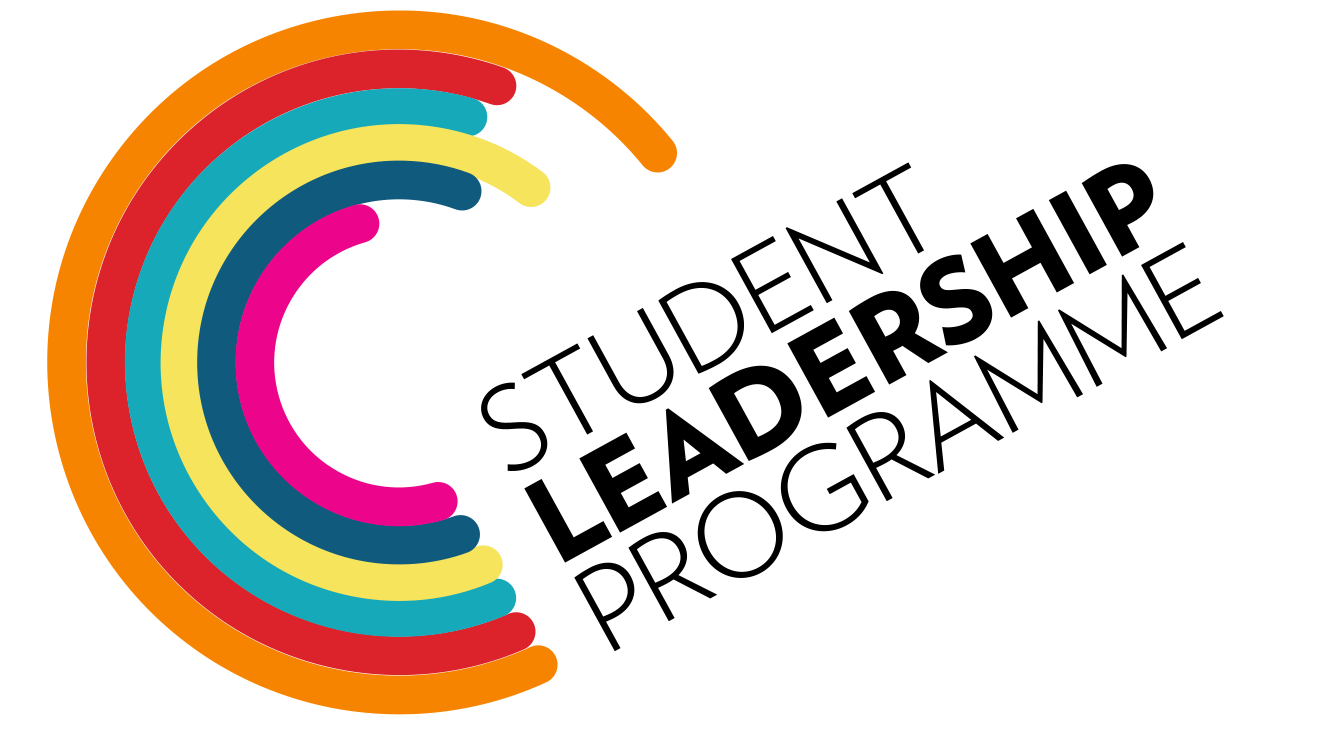2nd year Radiotherapy student – Sheffield Hallam University
From the very beginning of the residential welcome event it was clear that no one needed to be worried about not getting along with people or feeling excluded. Everyone wanted to talk to everyone. We couldn’t help ourselves. We all wanted to talk about our professions, share our experiences and ask questions of each other. I sensed a feeling of belonging amongst us all – being with like-minded people who would all speak up for the better of healthcare.
After our arrival, check-in and some lunch we were welcomed by Dr Katerina Kolyva, Executive Director of the CoDH, and discussed how you have to ‘be yourself’ when it comes to leadership. We discussed how leadership is situational and that you’re never a leader on your own, support from peers is essential. For me, the take home message from this initial discussion was that to be a leader you have to ask the ‘why?’ questions and sometimes it’s alright to feel uncomfortable because you need to push yourself. We then went on to talk about what makes each one of us unique and although the words ‘creative’, ‘resilient’ and ‘persistent’ came up most frequently, the stories behind each word for each individual were all very different. To round off the discussions it was highlighted that maintaining good and effective leadership is down to our own behaviour and that to be an authentic leader you need to have an awareness of yourself as well as having a whole system awareness that looks at the bigger picture.
 We participated in many group activities, however the one that stood out for me was a scenario-based group exercise during the first day which we then presented back to the rest of the room. Despite us all being from different professions it was so evident that we shared the same values and because we were all from different backgrounds and locations, as well as varying in ages, it meant that collectively we had a great wealth of experience to use to our advantage when tackling tricky situations. This just shows that by working collaboratively many more obstacles can be overcome. I initially thought that I wouldn’t be able to help my group much as the scenario that we had was not something that I had or was like to ever come across in my profession, but that was not the case at all. I asked questions of my peers to better understand the scenario and used my own experiences to suggest ways in which our given issue could be overcome.
We participated in many group activities, however the one that stood out for me was a scenario-based group exercise during the first day which we then presented back to the rest of the room. Despite us all being from different professions it was so evident that we shared the same values and because we were all from different backgrounds and locations, as well as varying in ages, it meant that collectively we had a great wealth of experience to use to our advantage when tackling tricky situations. This just shows that by working collaboratively many more obstacles can be overcome. I initially thought that I wouldn’t be able to help my group much as the scenario that we had was not something that I had or was like to ever come across in my profession, but that was not the case at all. I asked questions of my peers to better understand the scenario and used my own experiences to suggest ways in which our given issue could be overcome.
Before dinner we heard from our key note speaker Ismalia De Sousa, Clinical Nurse Specialist in Stroke at Imperial College Healthcare NHS Trust. What I took away from her story and the experiences she shared was that it comes down to passion, determination and self-belief in order to be successful. Her approach was so reflective and self-aware that it really made me think about how I reflect on my own practice. I don’t find reflection easy at all, but she really emphasised that being able to make note of a certain situation and how you handled it while it’s still fresh in your mind is a must. It was really great to then get to sit and eat with a new group of people yet again and learn about each other, I really appreciated being able to answer questions about my profession and highlight what we do as therapy radiographers.
As day two kicked off we got to hear from Joanne Bosanquet MBE, Deputy Chief Nurse of Public Health England and she was so very inspiring. We discussed advocacy – showing courage, empowering service users and giving them control to make informed decisions, challenging the norm and thinking about quality of life. All of these aspects are something that I see daily in the radiotherapy department and we have to be able to advocate for our patients effectively. We highlighted that the backbone of advocacy is empathy, as therapeutic radiographers we see our patients everyday and build relationships with them and so we are perfectly placed to challenge things that might not be working as we can see it from the patient’s perspective.
The important and often tough topics of emotional intelligence and resilience were next on the agenda, delivered by Adele Nightingale, Senior Lecturer in Healthcare Leadership Practice at the University of Central Lancashire. Resilience is made up from your adaptability, confidence, purposefulness and having social support and emotional intelligence comes from having social and self awareness, self management and relationship management. Both of these combine to create leadership – authentic, effective leadership. From my notes of this discussion I have written in capital letters and underlined: ‘the greatest asset you have is you!’ It became clear that if we don’t look after ourselves then we cannot look after our patients and their needs. This can be a real issue in radiotherapy in terms of emotional burn-out and so we need to be able to reflect on experiences in a healthy and meaningful way in order to prevent this from happening as much as possible. We also talked about the power of ‘yet’, so adding the word ‘yet’ to the end of statements – I am not a qualified therapeutic radiographer versus I am not a qualified therapeutic radiographer YET. But one day soon I will be! This was very motivational and really shifts your perspective onto a more positive front.
 The final speaker of the event was Nigel Harrison, Executive Dean of the Faculty of Health and Wellbeing at the University of Central Lancashire, and he shared his personal story of overcoming challenges to get where he is today. It highlighted to me that leaders are those who have the determination to be the very best they can be for the sake of others, they are the people who see the world and want to make a change. Nigel also shared how he copes with the pressures of his job, and by having something to look forward to (like a holiday or some such event) it keeps him moving forward and looking up. I feel that as a student we could all relate to this as we are always counting down to the next holiday or small amount of free time after a deadline and this is what keeps us moving forwards right now and that’s OK.
The final speaker of the event was Nigel Harrison, Executive Dean of the Faculty of Health and Wellbeing at the University of Central Lancashire, and he shared his personal story of overcoming challenges to get where he is today. It highlighted to me that leaders are those who have the determination to be the very best they can be for the sake of others, they are the people who see the world and want to make a change. Nigel also shared how he copes with the pressures of his job, and by having something to look forward to (like a holiday or some such event) it keeps him moving forward and looking up. I feel that as a student we could all relate to this as we are always counting down to the next holiday or small amount of free time after a deadline and this is what keeps us moving forwards right now and that’s OK.
I applied for the CoDH Student Leadership Programme primarily because I want to make a difference, I want to be able to inspire others to make a difference and I want to promote the amazing profession that I am going into. I wanted to learn about other professions and share in their experiences in order to make myself a better collaborator. I was greatly encouraged by my then course leader (Laura Pattinson) to apply and this really boosted my confidence to have her backing.
During my journey home I had plenty of time to reflect upon the experience and I have to admit I was scared. I was excited for sure, but I was scared. I was worried that I would have gained all these amazing experiences but not be able to do anything with it. I felt pressure to be more than what I am. But then I opened my feedback box (we all had a feedback box at the back of the conference room with out name on it for the other participants to leave anonymous feedback in) and it made me feel a million times better. People had written about my passion, my enthusiasm, my ability to articulate, my willingness to throw myself into everything, my empathy and most importantly to me numerous people had said they now knew what a therapeutic radiographer was! That’s when I realised that I don’t need to be anymore than what I am – I earned my place at this table and I wanted to use it to learn from others but also to teach others and that is exactly what I did and what I hope to continue to do.
In the weeks following the welcome event I have been assigned a mentor by the CoDH who is influential within healthcare and healthcare education and I cannot wait to meet with my mentor – Joanne Lymn, Head of School of Health Sciences at the University of Nottingham as I am sure she will be able to guide me between now and July extremely well in creating an attainable goal that will push me to be the very best I can be. I have been much more active on Twitter as this is such a great platform in which to engage with healthcare professionals across the country and I feel more confident in myself. This is evident in that I have put myself forward more already – myself and 3 of my fellow #150leaders have been in touch with the WeAHPs Twitter and are going to become actively involved with doing tweetchats and student take-overs and hopefully one day start a WeStudentAHPs account. I am very much looking forward to the next #150leaders event in London in July so that I can catch up with all the new friends I have made and see what incredible things we have all been up to. The programme really has created options for me that I never knew I could have and I am so grateful for being selected to be a part of this amazing community.
